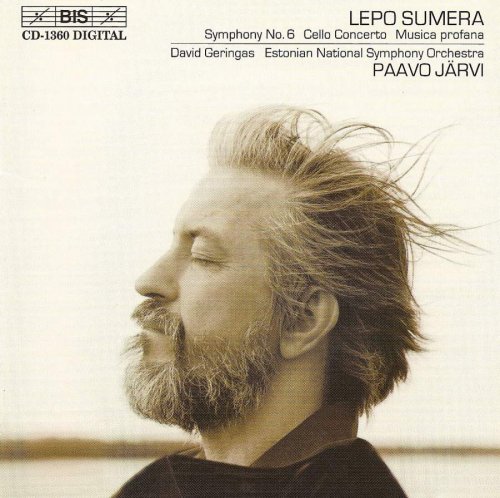
David Geringas, Estonian National Symphony Orchestra, Paavo Jarvi - Lepo Sumera: Symphony No. 6, Cello Concerto, Musica Profana (2003)
BAND/ARTIST: David Geringas, Estonian National Symphony Orchestra, Paavo Jarvi
- Title: Lepo Sumera: Symphony No. 6, Cello Concerto, Musica Profana
- Year Of Release: 2003
- Label: BIS
- Genre: Classical
- Quality: APE (image+.cue,scans)
- Total Time: 01:06:20
- Total Size: 291 Mb
- WebSite: Album Preview
Tracklist:
Cello Concerto
01. I. Allegro 09:01
02. II. Larghetto 09:17
03. III. Poco a poco accelerando 09:48
Musica Profana
04 Musica Profana 12:25
Symphony No. 6
05. I. Andante furioso 14:00
06. II. Andante 10:27
Performers:
David Geringas, cello
Estonian National Symphony Orchestra
Paavo Jarvi, conductor
Cello Concerto
01. I. Allegro 09:01
02. II. Larghetto 09:17
03. III. Poco a poco accelerando 09:48
Musica Profana
04 Musica Profana 12:25
Symphony No. 6
05. I. Andante furioso 14:00
06. II. Andante 10:27
Performers:
David Geringas, cello
Estonian National Symphony Orchestra
Paavo Jarvi, conductor
This was my first encounter with the music of Lepo Sumera (1950-2000). His is a communicative, urgently intense voice, which proclaims a ready kinship with other leading Baltic figures such as Arvo Pärt, Erkki-Sven Tüür and Peteris Vasks. I detect echoes, too, of Shostakovich, Britten, Sallinen and John Adams. At the same time, I wouldn’t want to give the impression that Sumera lacks his own distinctive personality – far from it; his chosen idiom is readily assimilable and he speaks without artifice.
Both the Cello Concerto (1998-99) and Sixth Symphony (2000) derive their thematic inspiration from his In memoriam of 1972 (Sumera’s breakthrough composition, dedicated to the memory of his teacher at the Estonian Academy of Music, Heino Eller). So assiduously does the fomer eschew any element of conventional solo display that it emerges more as a Symphony-Concerto, although, as with its equally brooding companion (the last work penned by Sumera before his sudden death from heart failure less than a month after his 50th birthday), I hanker after more logic and drive – precisely those qualities, in fact, which inform the writing of a natural symphonic thinker such as, say, his elder countryman, Eduard Tubin. Musica profana (1997) is different again, akin to a concerto for string orchestra in its beguiling variety of timbre, texture and mood, and by far the most immediately approachable of the present triptych.
Ultimately, like David Fanning and Guy Rickards reviewing previous instalments in this series (BIS, 12/94, 9/95 and 5/97), I still harbour doubts as to Sumera’s truly symphonic instinct, and indeed his music’s eventual staying power. What’s not in doubt, though, is the superbly stylish and committed advocacy the composer enjoys here from cellist David Geringas, Paavo Järvi and the admirable Estonian National SO. The sound is extremely vivid, without perhaps being in the top bracket.
Both the Cello Concerto (1998-99) and Sixth Symphony (2000) derive their thematic inspiration from his In memoriam of 1972 (Sumera’s breakthrough composition, dedicated to the memory of his teacher at the Estonian Academy of Music, Heino Eller). So assiduously does the fomer eschew any element of conventional solo display that it emerges more as a Symphony-Concerto, although, as with its equally brooding companion (the last work penned by Sumera before his sudden death from heart failure less than a month after his 50th birthday), I hanker after more logic and drive – precisely those qualities, in fact, which inform the writing of a natural symphonic thinker such as, say, his elder countryman, Eduard Tubin. Musica profana (1997) is different again, akin to a concerto for string orchestra in its beguiling variety of timbre, texture and mood, and by far the most immediately approachable of the present triptych.
Ultimately, like David Fanning and Guy Rickards reviewing previous instalments in this series (BIS, 12/94, 9/95 and 5/97), I still harbour doubts as to Sumera’s truly symphonic instinct, and indeed his music’s eventual staying power. What’s not in doubt, though, is the superbly stylish and committed advocacy the composer enjoys here from cellist David Geringas, Paavo Järvi and the admirable Estonian National SO. The sound is extremely vivid, without perhaps being in the top bracket.
As a ISRA.CLOUD's PREMIUM member you will have the following benefits:
- Unlimited high speed downloads
- Download directly without waiting time
- Unlimited parallel downloads
- Support for download accelerators
- No advertising
- Resume broken downloads


